
Mautic is an open-source marketing automation platform that helps businesses and organizations manage, automate, and optimize their marketing campaigns across various channels like email, social media, and text messages. It provides tools for lead management, campaign automation, landing page creation, customer segmentation, and performance tracking. As an open-source solution, Mautic is free to use, customizable, and allows businesses to own their data and avoid vendor lock-in. In this step by step guide I will show you how to install Mautic 6 on your UGREEN NAS using Docker and Portainer.
This guide works perfectly with the latest Mautic 6.0.7 release.
STEP 1
Please Support My work by Making a Donation.
STEP 2
Install Portainer using my step by step guide. If you already have Portainer installed on your UGREEN NAS, skip this STEP. Attention: Make sure you have installed the latest Portainer version.
STEP 3
⚠️Mandatory: Enable HTTPS on your UGREEN NAS.
STEP 4
Create a new hostname on the noip website using your noip account. For example, I have created mariustic as Host and I use the free ddns.net domain. In the IP Address area, type in your own IPV4 IP address from your ISP, then click Create. Follow the instructions in the image below.
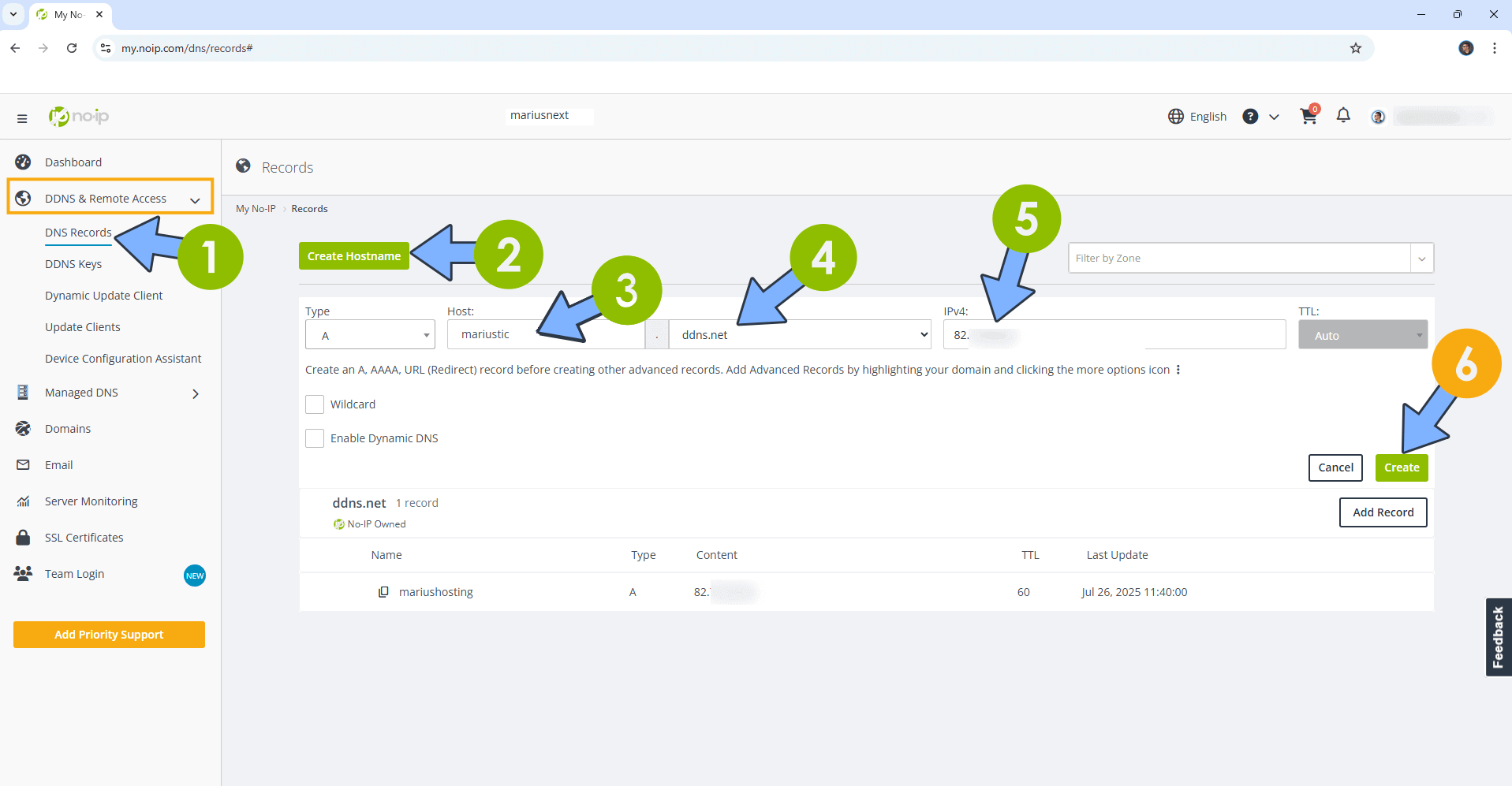
STEP 5
Go to Files and open the docker folder. Inside the docker folder, create one new folder and name it mautic. Follow the instructions in the image below.
Note: Be careful to enter only lowercase, not uppercase letters.
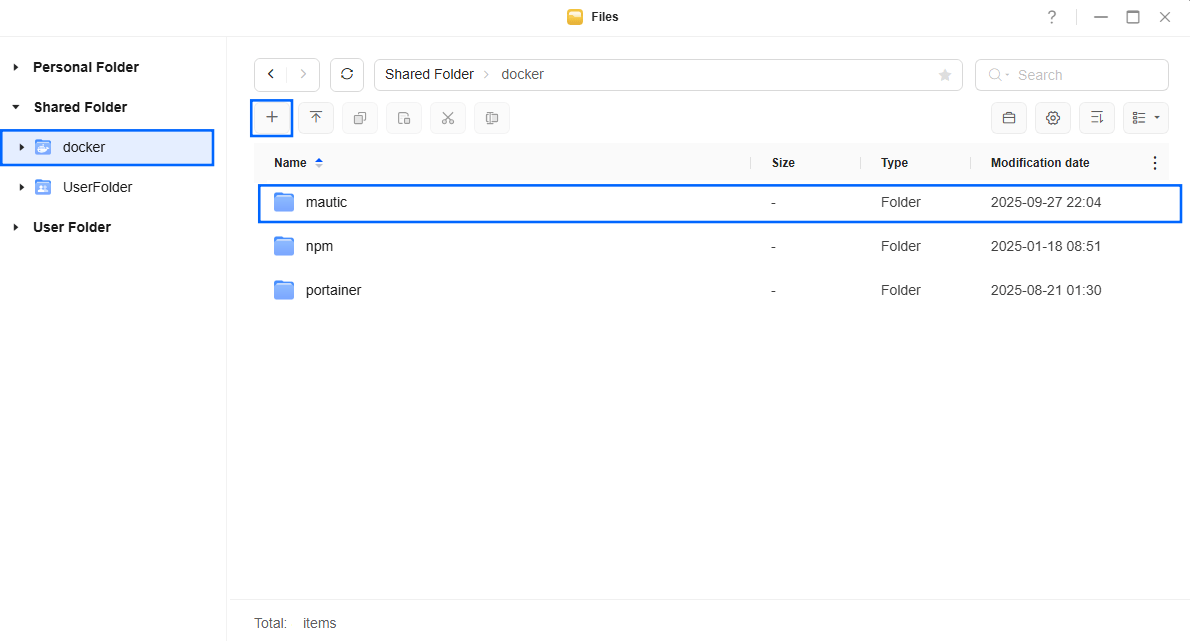
STEP 6
Now create seven new folders inside the mautic folder that you have previously created at STEP 5 and name them config, cron, db, files, images, logs, var. Follow the instructions in the image below.
Note: Be careful to enter only lowercase, not uppercase letters.
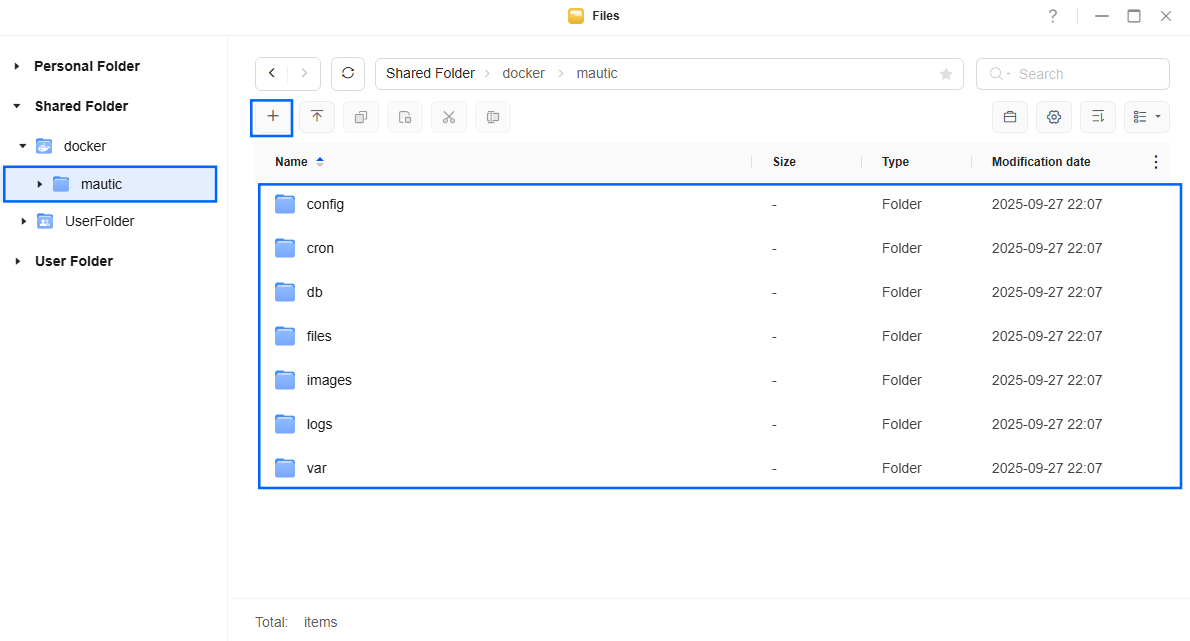
STEP 7
Log into Portainer using your username and password. On the left sidebar in Portainer, click on Home then Live connect. Follow the instructions in the image below.

On the left sidebar in Portainer, click on Stacks then + Add stack. Follow the instructions in the image below.

STEP 8
In the Name field type in mautic. Follow the instructions in the image below.
services:
db:
image: mysql:8.0
container_name: Mautic-DB
healthcheck:
test: mysqladmin -p$$MYSQL_ROOT_PASSWORD ping -h localhost
interval: 20s
start_period: 10s
timeout: 10s
retries: 3
hostname: mautic_db
environment:
MYSQL_ROOT_PASSWORD: rootpass
MYSQL_DATABASE: mautic
MYSQL_USER: mauticuser
MYSQL_PASSWORD: mauticpass
volumes:
- /volume1/docker/mautic/db:/var/lib/mysql:rw
restart: on-failure:5
mautic_web:
image: mautic/mautic:6-apache
container_name: Mautic-WEB
healthcheck:
test: timeout 10s bash -c ':> /dev/tcp/127.0.0.1/80' || exit 1
interval: 10s
timeout: 5s
retries: 3
start_period: 90s
ports:
- 4280:80
environment:
MAUTIC_DB_HOST: mautic_db
MAUTIC_INSTALL_FORCE: 1
MAUTIC_DB_PORT: 3306
MAUTIC_DB_NAME: mautic
MAUTIC_DB_USER: mauticuser
MAUTIC_DB_PASSWORD: mauticpass
MAUTIC_ADMIN_EMAIL: yourown@email
MAUTIC_ADMIN_USERNAME: marius
MAUTIC_ADMIN_PASSWORD: Mariushosting84@@marius
MAUTIC_URL: https://mariustic.ddns.net
DOCKER_MAUTIC_ROLE: mautic_web
DOCKER_MAUTIC_WORKERS_CONSUME_EMAIL: 2 #or more
DOCKER_MAUTIC_WORKERS_CONSUME_HIT: 2 #or more
DOCKER_MAUTIC_WORKERS_CONSUME_FAILED: 2 #or more
volumes:
- /volume1/docker/mautic/config:/var/www/html/config:rw
- /volume1/docker/mautic/logs:/var/www/html/var/logs:rw
- /volume1/docker/mautic/files:/var/www/html/docroot/media/files:rw
- /volume1/docker/mautic/images:/var/www/html/docroot/media/images:rw
- /volume1/docker/mautic/cron:/opt/mautic/cron:rw
- /volume1/docker/mautic/var:/var/www/html/var:rw
depends_on:
db:
condition: service_healthy
restart: on-failure:5
mautic_worker:
image: mautic/mautic:6-apache
container_name: Mautic-WORKER
volumes:
- /volume1/docker/mautic/config:/var/www/html/config:rw
- /volume1/docker/mautic/logs:/var/www/html/var/logs:rw
- /volume1/docker/mautic/files:/var/www/html/docroot/media/files:rw
- /volume1/docker/mautic/images:/var/www/html/docroot/media/images:rw
- /volume1/docker/mautic/cron:/opt/mautic/cron:rw
- /volume1/docker/mautic/var:/var/www/html/var:rw
environment:
MAUTIC_DB_HOST: mautic_db
MAUTIC_INSTALL_FORCE: 1
MAUTIC_DB_PORT: 3306
MAUTIC_DB_NAME: mautic
MAUTIC_DB_USER: mauticuser
MAUTIC_DB_PASSWORD: mauticpass
MAUTIC_ADMIN_EMAIL: yourown@email
MAUTIC_ADMIN_USERNAME: marius
MAUTIC_ADMIN_PASSWORD: Mariushosting84@@marius
MAUTIC_URL: https://mariustic.ddns.net
DOCKER_MAUTIC_ROLE: mautic_worker
DOCKER_MAUTIC_WORKERS_CONSUME_EMAIL: 2
DOCKER_MAUTIC_WORKERS_CONSUME_HIT: 2
DOCKER_MAUTIC_WORKERS_CONSUME_FAILED: 2
depends_on:
- db
restart: on-failure:5
mautic_cron:
image: mautic/mautic:6-apache
container_name: Mautic-CRON
volumes:
- /volume1/docker/mautic/config:/var/www/html/config:rw
- /volume1/docker/mautic/logs:/var/www/html/var/logs:rw
- /volume1/docker/mautic/files:/var/www/html/docroot/media/files:rw
- /volume1/docker/mautic/images:/var/www/html/docroot/media/images:rw
- /volume1/docker/mautic/cron:/opt/mautic/cron:rw
- /volume1/docker/mautic/var:/var/www/html/var:rw
environment:
MAUTIC_DB_HOST: mautic_db
MAUTIC_INSTALL_FORCE: 1
MAUTIC_DB_PORT: 3306
MAUTIC_DB_NAME: mautic
MAUTIC_DB_USER: mauticuser
MAUTIC_DB_PASSWORD: mauticpass
MAUTIC_ADMIN_EMAIL: yourown@email
MAUTIC_ADMIN_USERNAME: marius
MAUTIC_ADMIN_PASSWORD: Mariushosting84@@marius
MAUTIC_URL: https://mariustic.ddns.net
DOCKER_MAUTIC_ROLE: mautic_cron
depends_on:
- db
restart: on-failure:5
Note: Before you paste the code above in the Web editor area below, change the value for MAUTIC_ADMIN_EMAIL. Type in your own Administrator Email. You will need this email later at STEP 18.
Note: Before you paste the code above in the Web editor area below, change the value for MAUTIC_ADMIN_USERNAME. Type in your own username. marius is an example for a username. You will need this username later at STEP 18.
Note: Before you paste the code above in the Web editor area below, change the value for MAUTIC_ADMIN_PASSWORD. Type in your own password. Mariushosting84@@marius is an example for a password. You will need this password later at STEP 18. ⚠️Warning: Your password must combine uppercase letters (A-Z), lowercase letters (a-z), numbers (0-9), and special characters (e.g., !, @, #, $).
Note: Before you paste the code above in the Web editor area below, change the value for MAUTIC_URL and type in your own NO IP DDNS address that you have previously created at STEP 4, with https:// at the beginning.
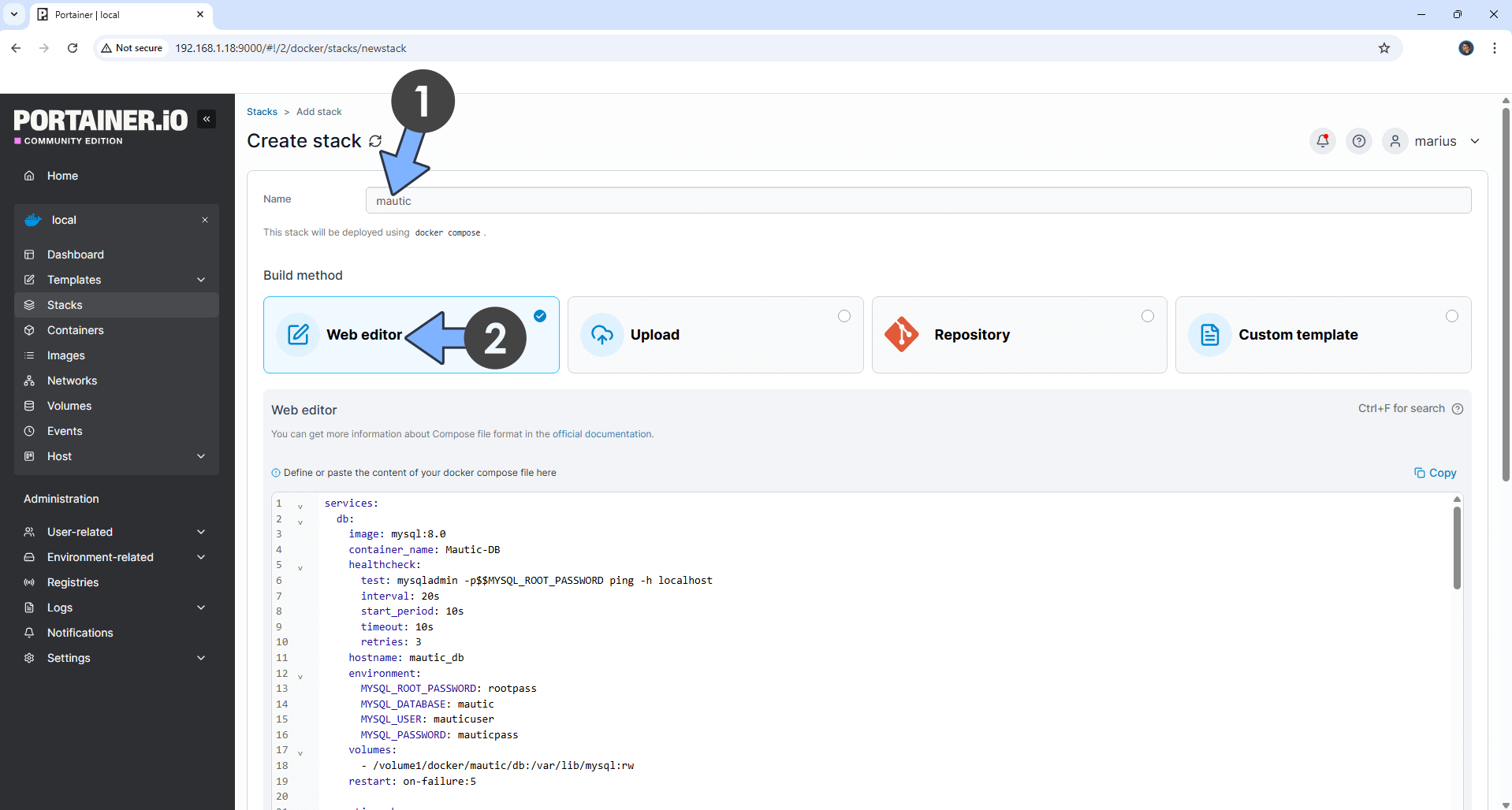
STEP 9
Scroll down on the page until you see a button named Deploy the stack. Click on it. Follow the instructions in the image below. The installation process can take up to a few minutes. It will depend on your Internet speed connection.
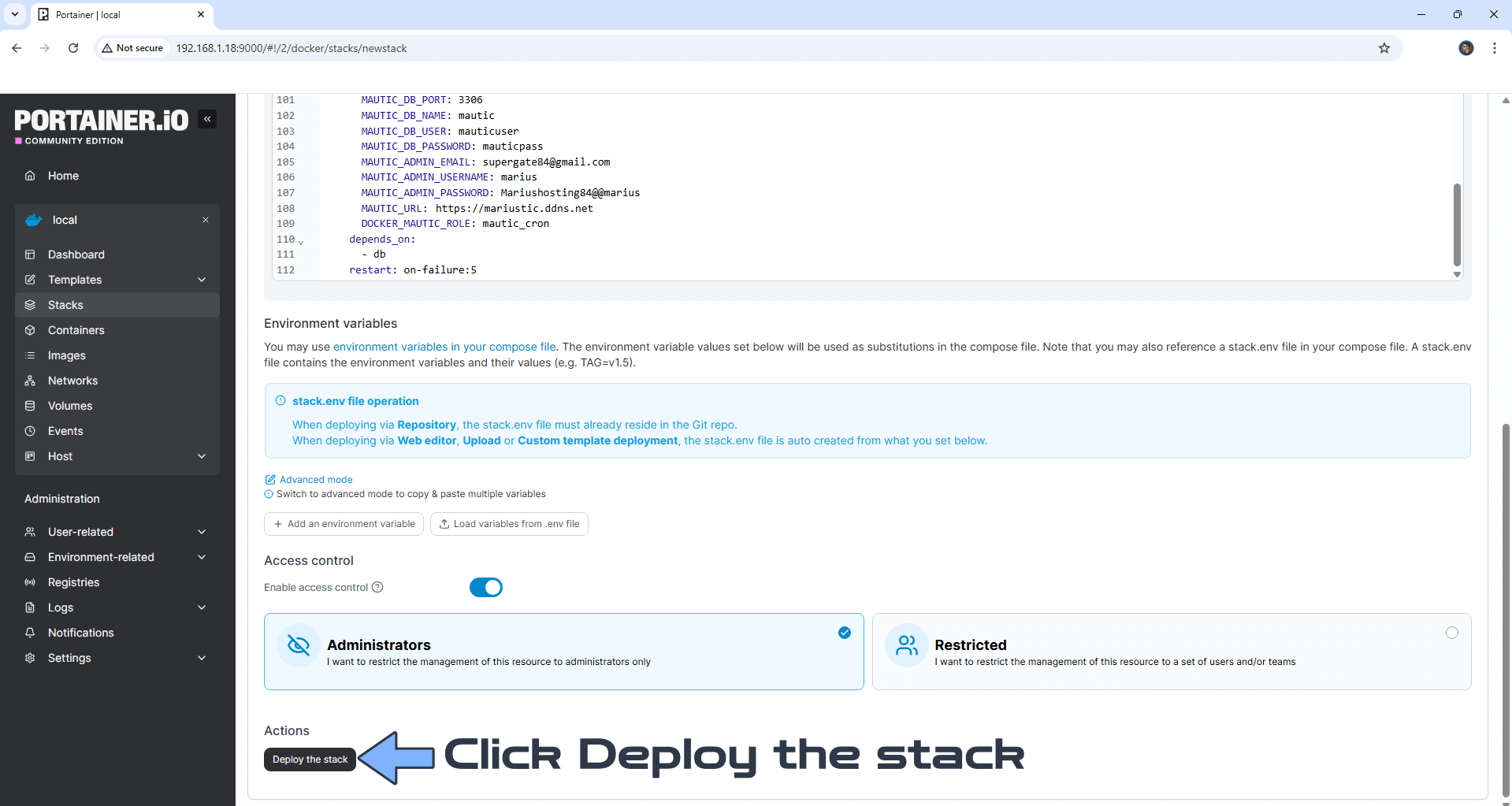
STEP 10
If everything goes right, you will see the following message at the top right of your screen: “Success Stack successfully deployed“.

STEP 11
Open your Nginx Proxy Manager container that you have previously installed at STEP 3. Click Add Proxy Host. A new pop up window will open. Add the following details:
Domain Names: Type in your own noip domain name that you have previously created at STEP 4.
Scheme: http
Forward Hostname/IP: Type in the local NAS IP of your UGREEN NAS.
Forward Port: Type in the Mautic local Port that is 4280
Check Block Common Exploits
Check Websockets Support
Click the SSL tab. Follow the instructions in the image below.
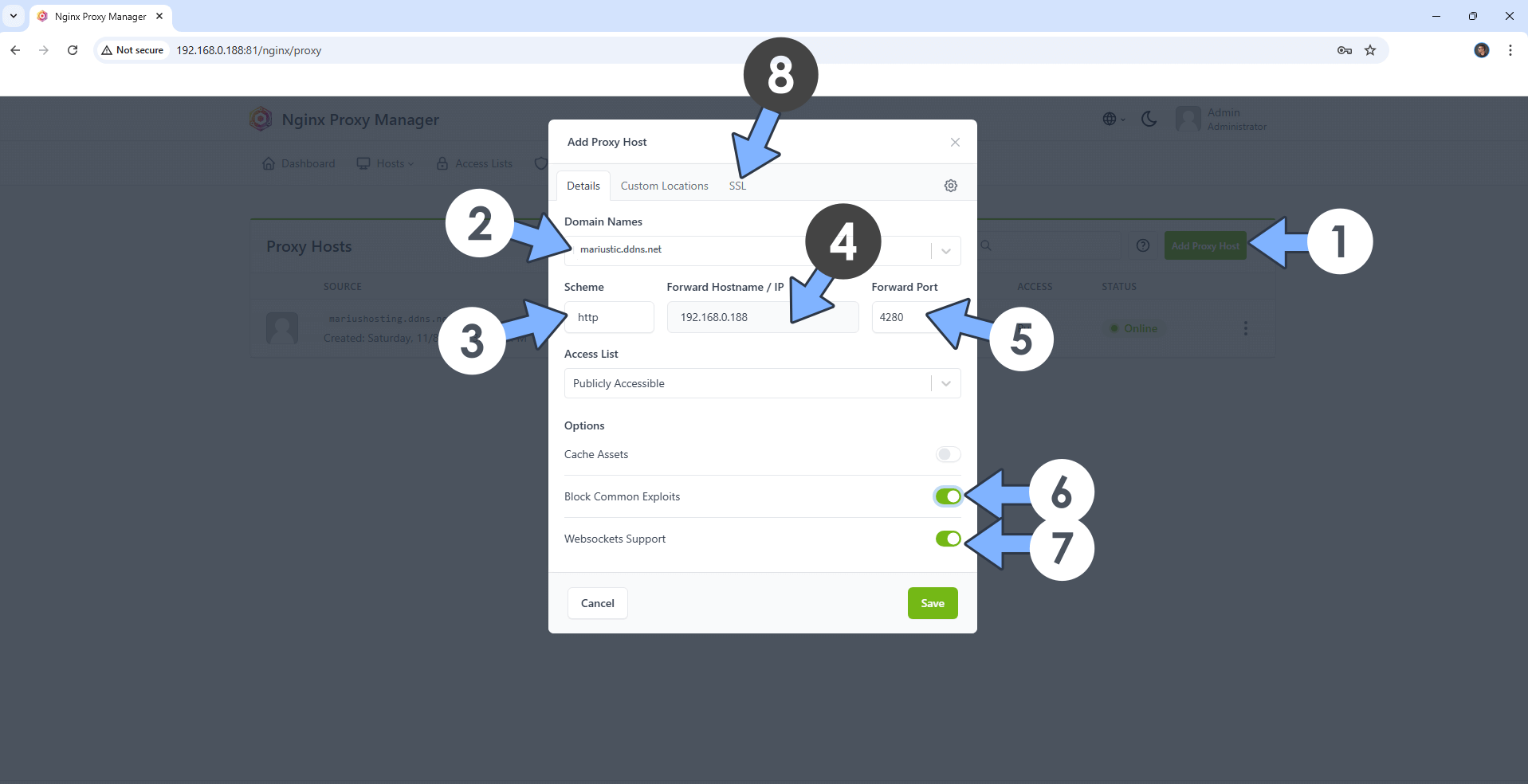
STEP 12
After you click the SSL tab, add the following details:
SSL Certificate: Request a new SSL Certificate
Check: Force SSL
Check: HSTS Enabled
Check: HTTP/2 Support
Click Save. Follow the instructions in the image below.
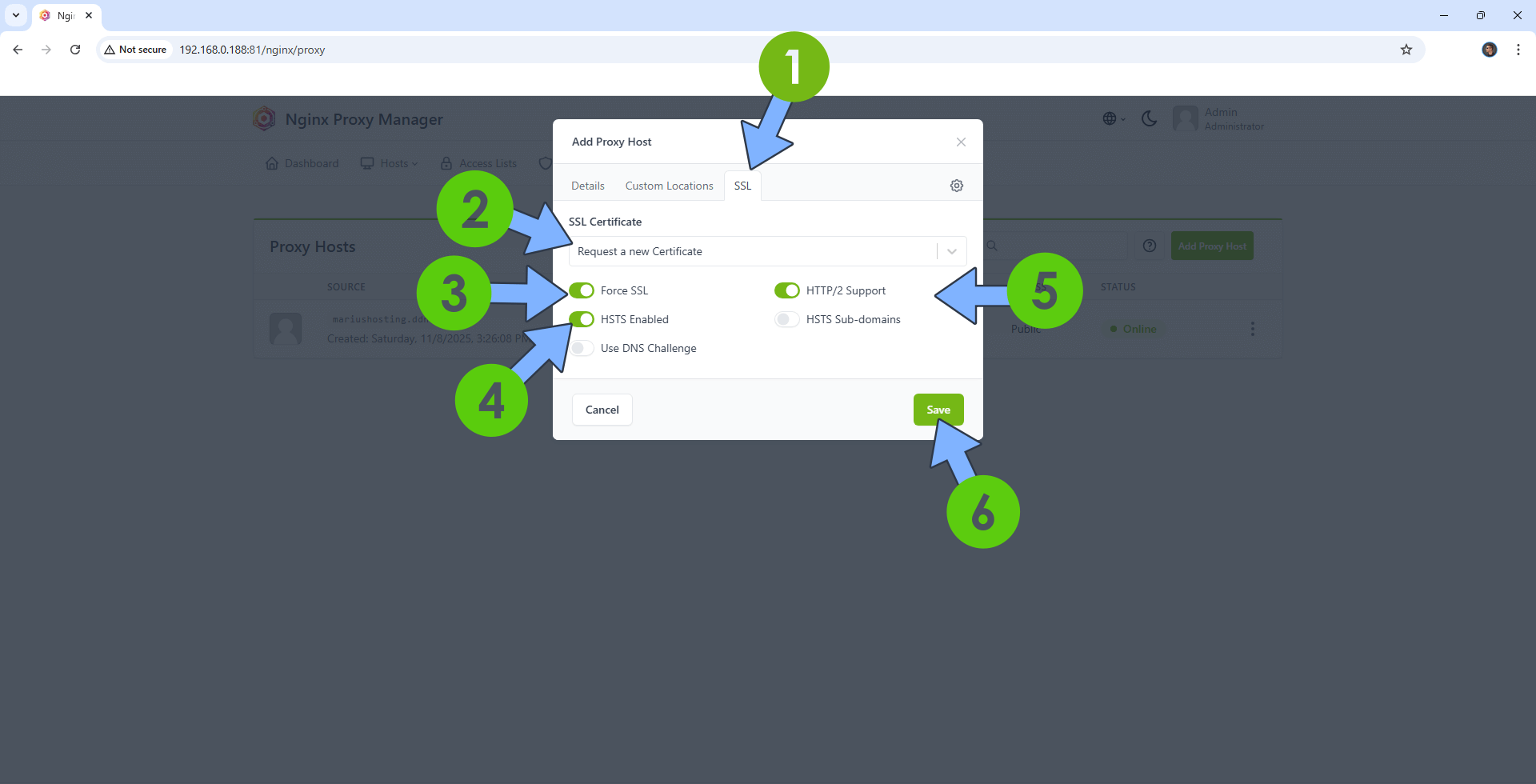
STEP 13
In the Proxy Hosts area, if everything goes right, you will see that your mautic hostname has been generated. Click on it. Follow the instructions in the image below.
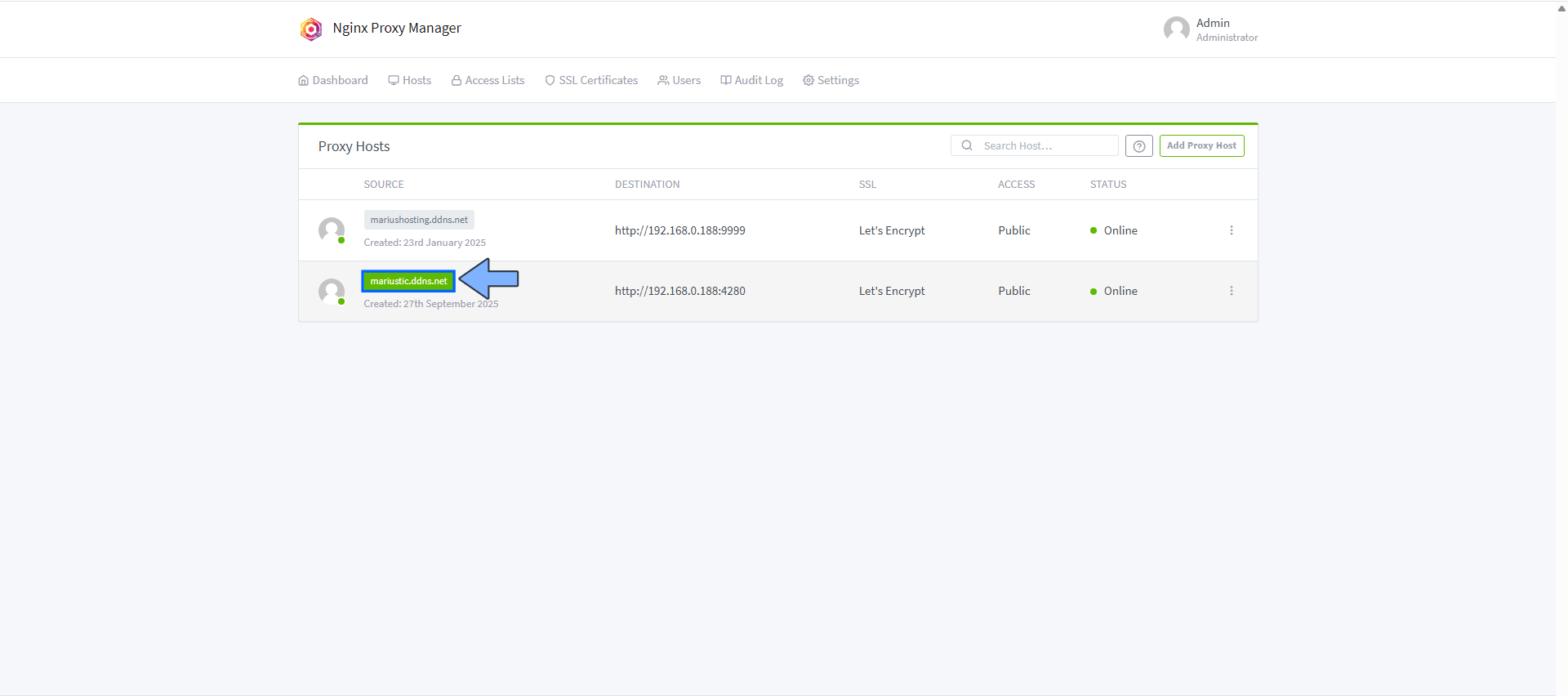
STEP 14
🟢Please Support My work by Making a Donation. Almost 99,9% of the people that install something using my guides forget to support my work, or just ignore STEP 1. I’ve been very honest about this aspect of my work since the beginning: I don’t run any ADS, I don’t require subscriptions, paid or otherwise, I don’t collect IPs, emails, and I don’t have any referral links from Amazon or other merchants. I also don’t have any POP-UPs or COOKIES. I have repeatedly been told over the years how much I have contributed to the community. It’s something I love doing and have been honest about my passion since the beginning. But I also Need The Community to Support me Back to be able to continue doing this work.
STEP 15
Now open your browser and type in your HTTPS/SSL certificate like this https://mautic.ddns.net In my case it’s https://mariustic.ddns.net If everything goes right, you will see the Mautic 6 installation page. Click Next Step. Follow the instructions in the image below.
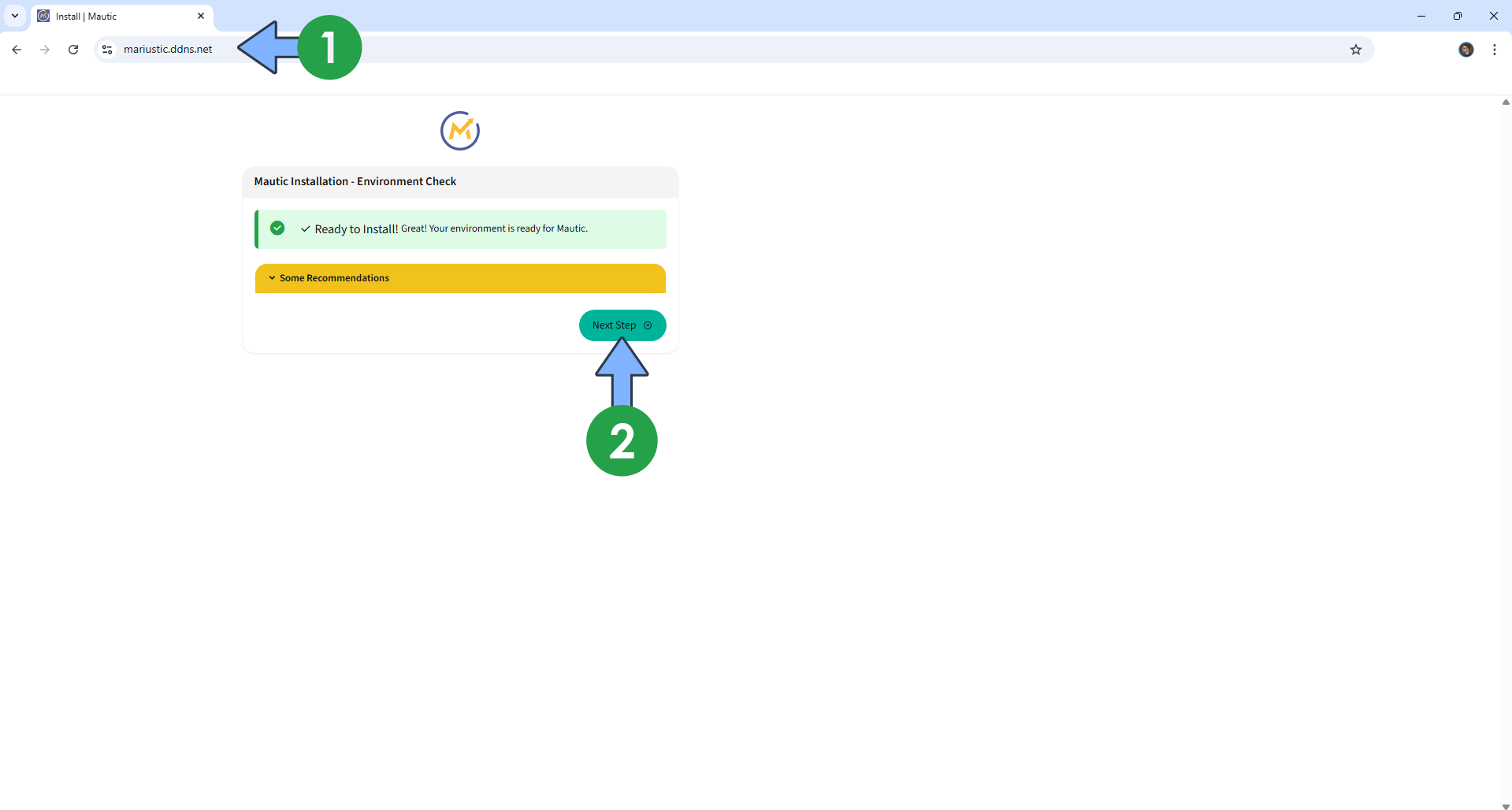
STEP 16
In the Database Setup page, add the following:
Database Host: mautic_db
Database Port: 3306
Database Name: mautic
Database Prefix: Leave it empty.
Database Username: mauticuser
Database Password: mauticpass
Backup existing tables: Yes.
Prefix for backup tables: bak_
Click Next Step. Follow the instructions in the image below.
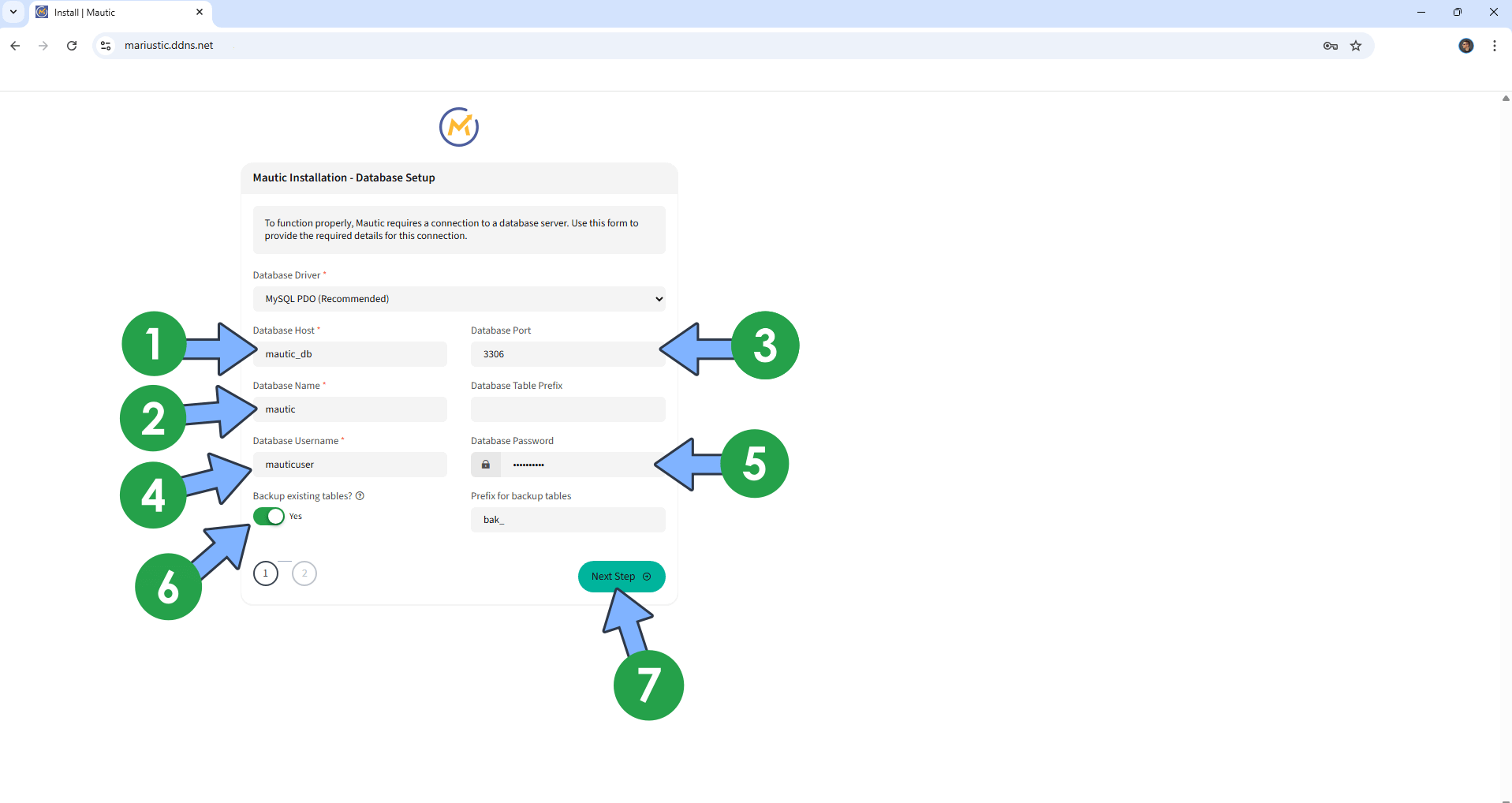
STEP 17
Wait some minutes until the database is created. Go to the next STEP.
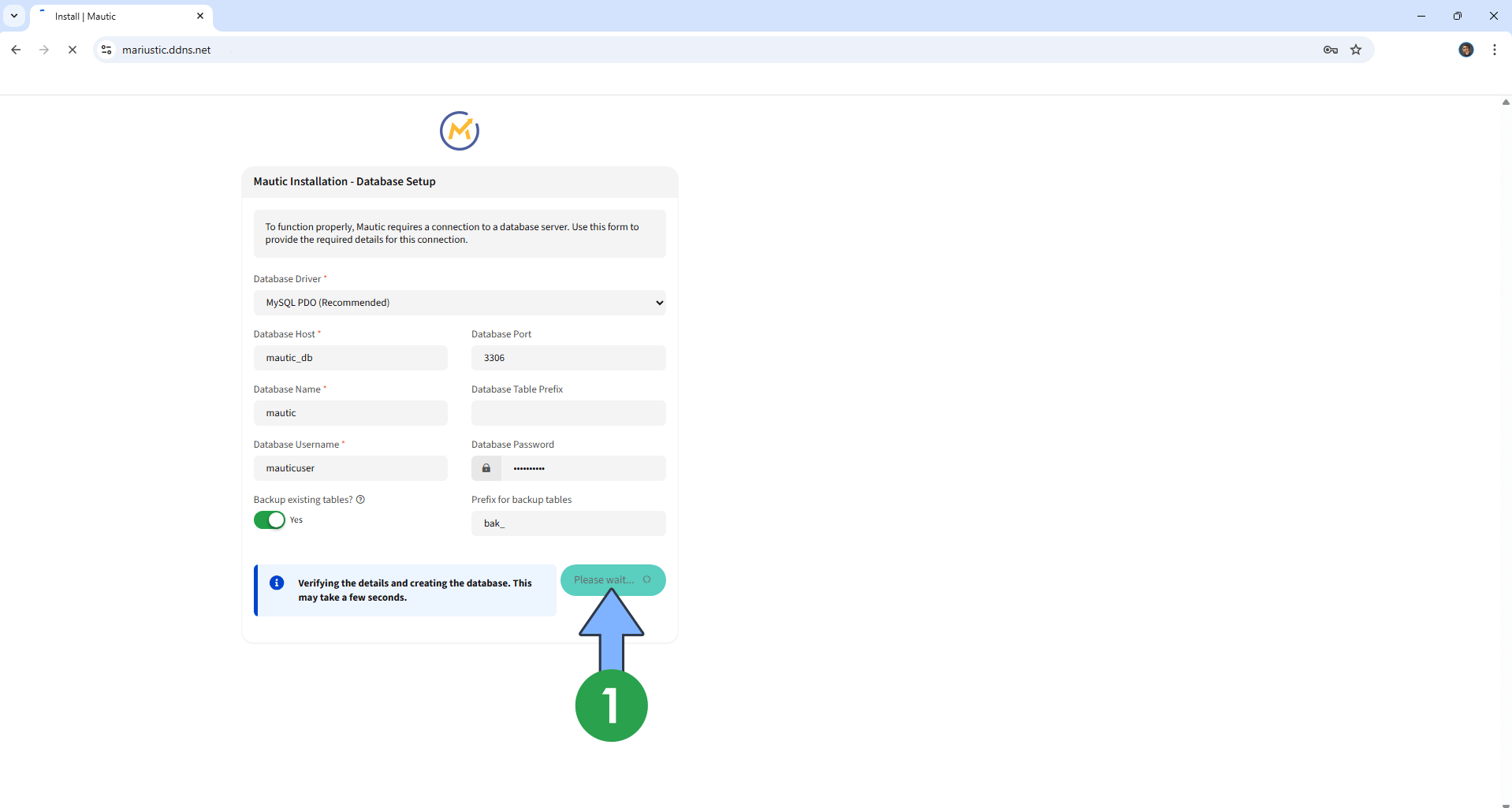
STEP 18
Add your Administrator user. Type in the following:
Admin Username: Type in your own (MAUTIC_ADMIN_USERNAME) that you have previously added at STEP 8.
Admin Password: Type in your own (MAUTIC_ADMIN_PASSWORD) that you have previously added at STEP 8.
E-Mail Address: Type in your own (MAUTIC_ADMIN_EMAIL) that you have previously added at STEP 8.
Follow the instructions in the image below.
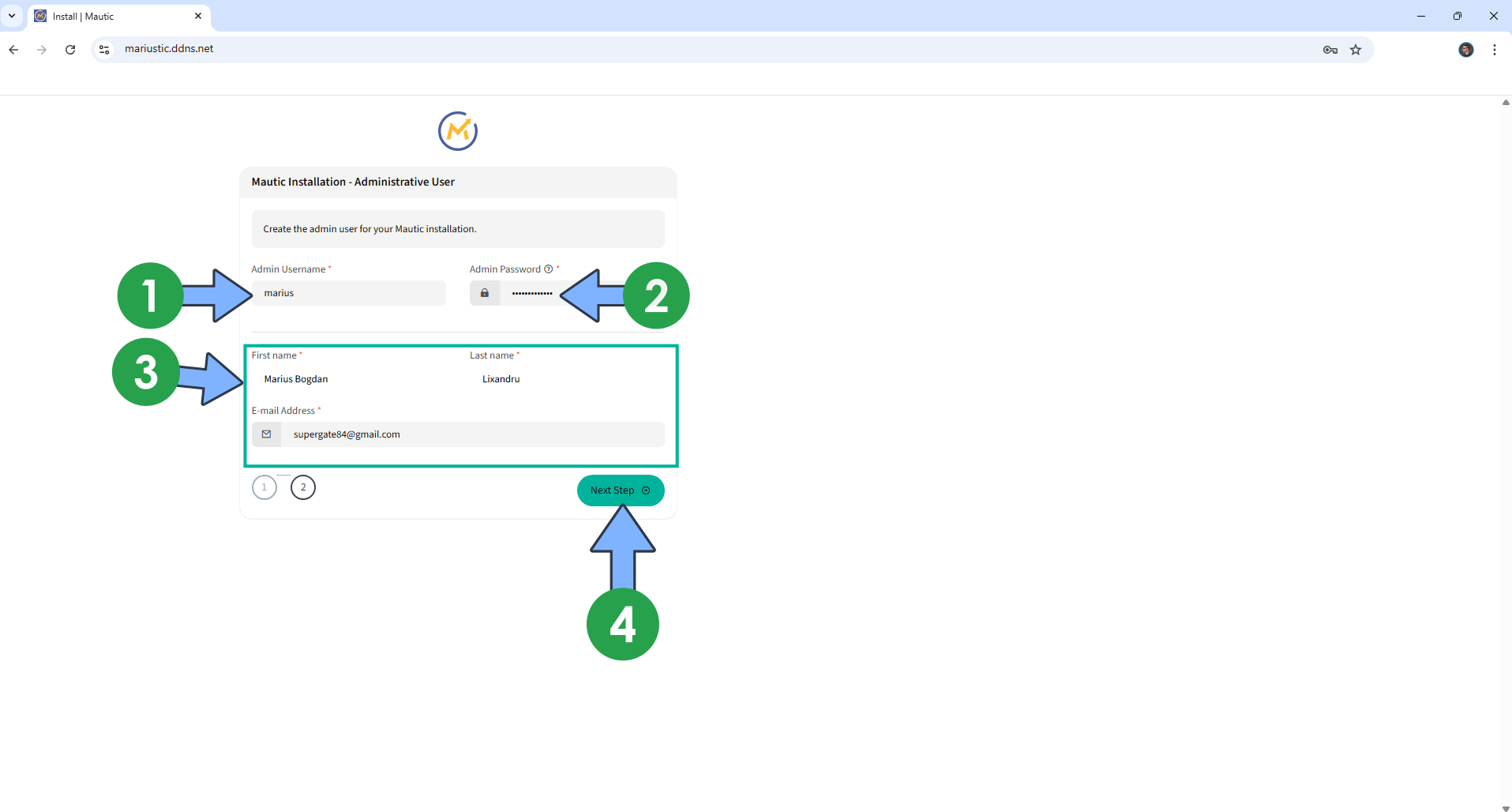
STEP 19
Type in your own Email Address and Password that you have previously added at STEP 18. Click Login. Follow the instructions in the image below.
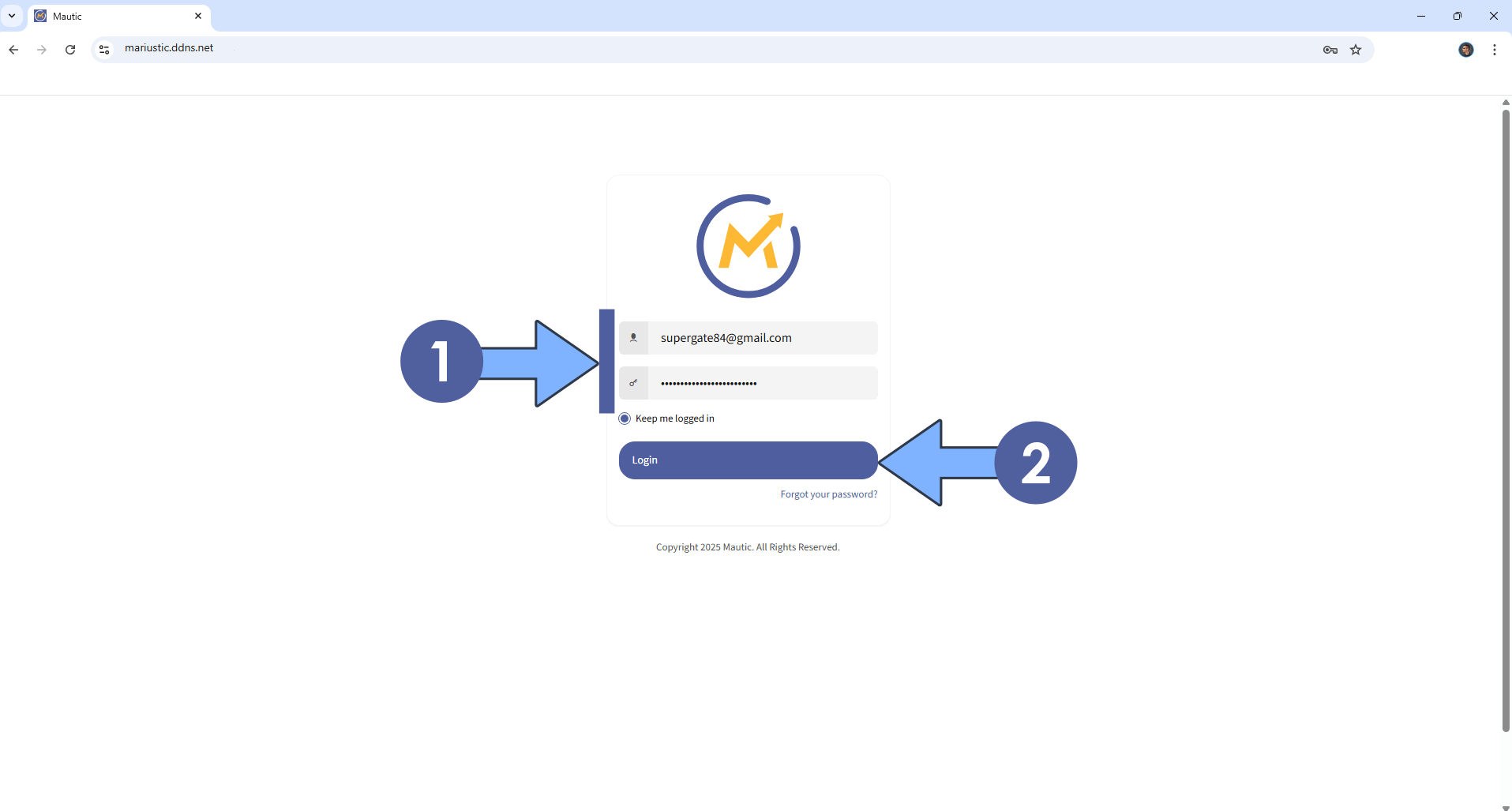
STEP 20
At the top right of the page, click on the user icon then Account. On the left sidebar, click Appearance. Select your favorite theme combination. Click Save. Follow the instructions in the image below.
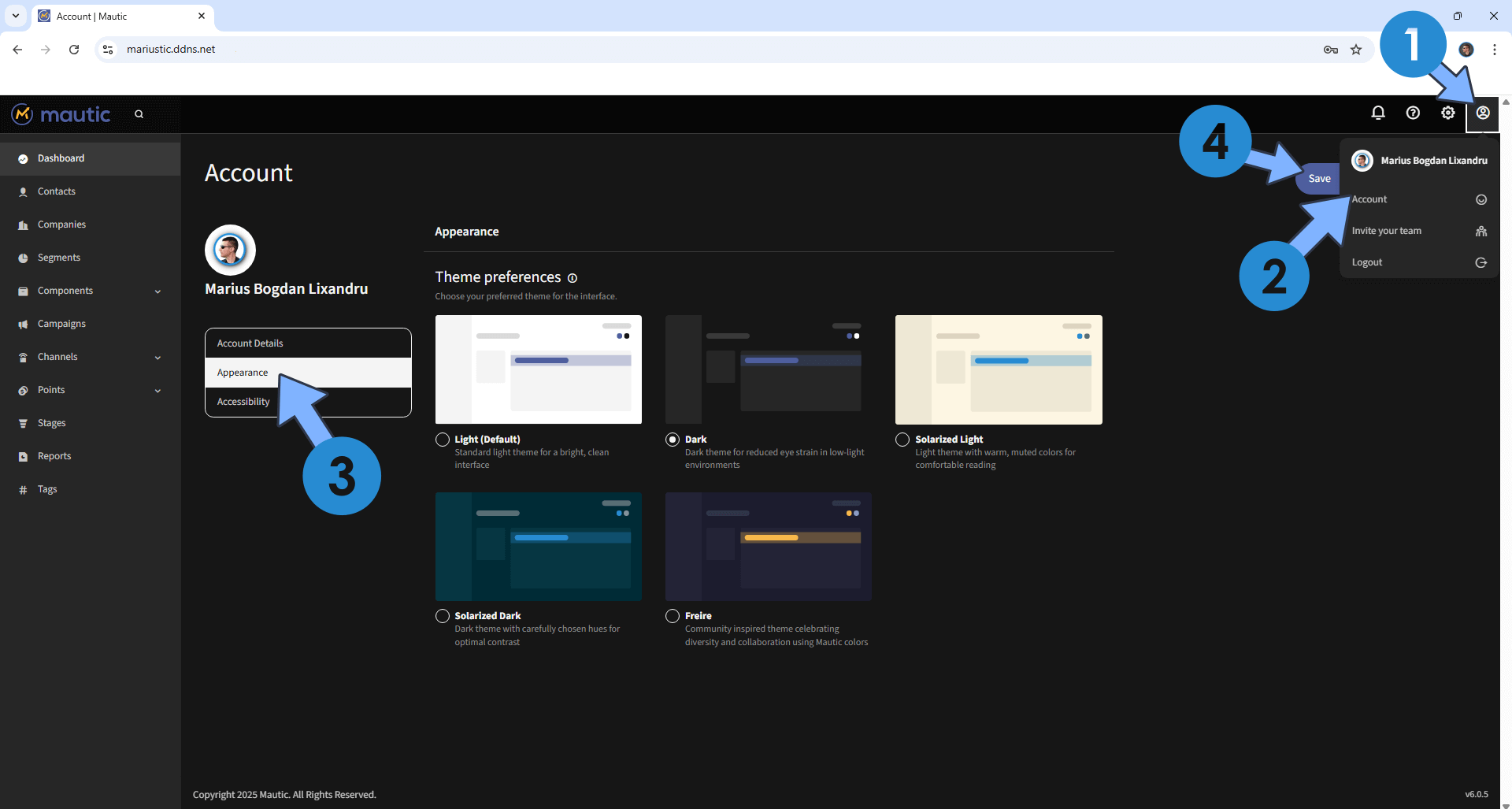
STEP 21
Your Mautic 6 dashboard at a glance!
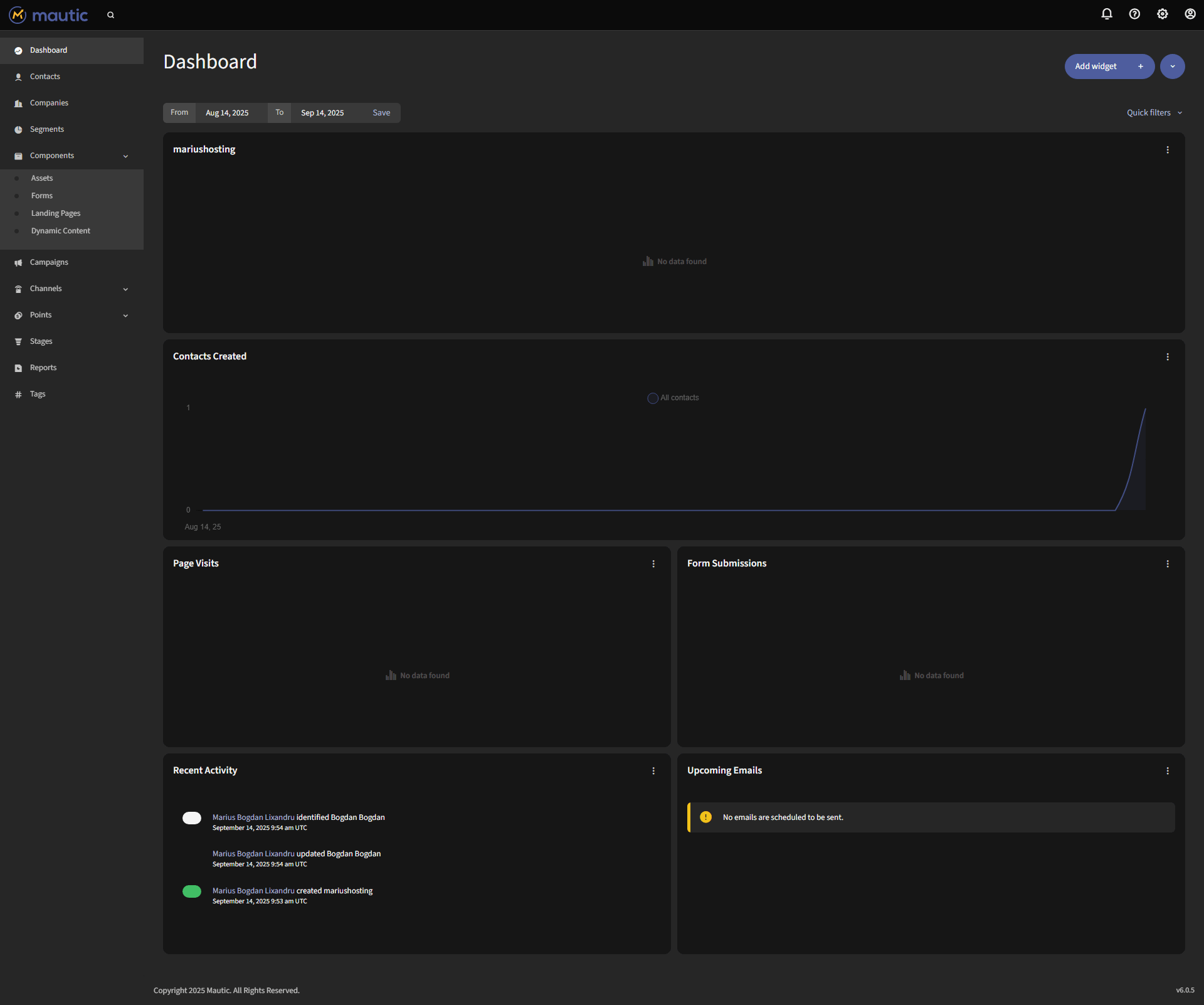
STEP 22
Step by step guide on how to Set up Email Notifications on Mautic 6.
Enjoy Mautic 6!
STEP 23
Need Mautic version 7 instead of Mautic version 6? Download (click on the blue link below) to download the Mautic V7 Docker Compose version. 🔒Note: Support my work to unlock the password. You can use this password to download any file on mariushosting forever!
🆙Note/Update/Container: How to Update Your Docker Containers on UGREEN NAS Using Portainer.
🐳Note: How to Create Docker Shortcuts on Desktop.
🆕Note: How to Update Portainer to the latest version.
🆕Note: How to Clean Docker.
This post was updated on Saturday / January 24th, 2026 at 12:03 AM
